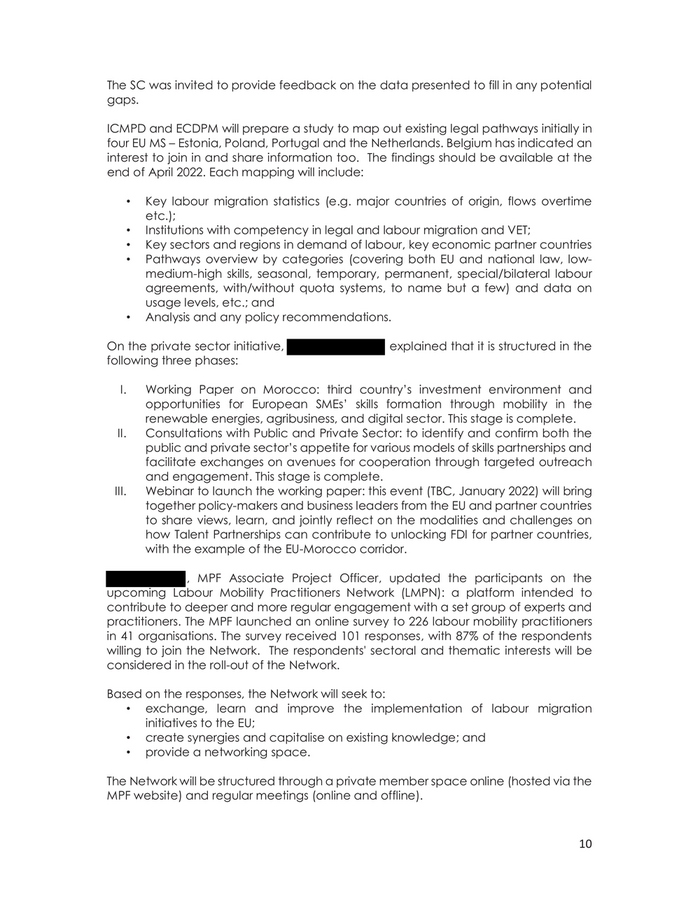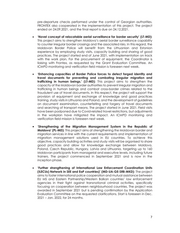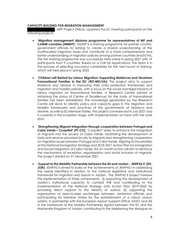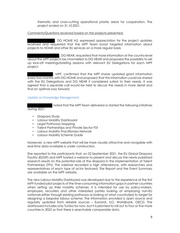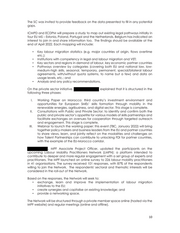mpf12thsteeringcommitteemeetingminutes-finalversion-redacted
Dieses Dokument ist Teil der Anfrage „correspondence ICMPD“
Ref. Ares(2022)4695389 - 27/06/2022 M>rF Migration Partnership Facility 12th Steering Committee Meeting 02 December 2021, 14:00 - 17:00 (Online Meeting via WebEx) Minutes

Dr @ec.europa.eu DG HOME @ec.europa.eu DG HOME @ec.europa.eu DG NEAR DG INTPA DG HOME @ec.europa.eu DG HOME @ec.europa.eu DG HOME DG HOME EEAS ICMPD ICMPD ICMPD ICMPD ICMPD ICMPD ICMPD ICMPD ICMPD ICMPD ICMPD ICMPD ICMPD ICMPD ICMPD | Recordot roceeaings of Proceedings Opening remarks: The recently appointed Deputy Head of Unit A3 in DG HOME - expressed her warm welcome to the parficipants and made opening remarks with a special focus on the willingness of DG HOME to continue supporting the MPF programme in the future. The Director of ICMPD Brussels Mission — also extended a welcome to all the participants in the 12!r MPF Steering Committee Meeting. He reported on the latest achievements of the MPF and highlighted the important contribution that the programme is making to the implementation of the external dimension of the EU’s migration policy. He explained that the ICMPD Vienna Migration Conference (held on 19-20/10/2021 — Vienna) was a key opportunity to reaffirm the relevance of the MPF to a vast array of partners and announced that Germany will assume chairmanship of ICMPD in 2022 with a key focus on partinership approaches to migration management.

The MPF Senior Project Manager - - presented the agenda (see annex) and opened the meeting with the following highlights: - The name of the programme changed to the Migration Partnership Facility with the signature of Addendum I to the MPF in June 202; - 14 new projects have been awarded from the grant funds from MPF III – 12 grants and 2 ICMPD-administered projects; - A second MPF III Call for Proposals has been developed based on lessons learned and will be launched shortly; - Several initiatives were launched to support the development of the EU Talent Partnerships; - A new Guide has been developed on steps to consider when setting up a labour mobility scheme; - The Prague Process E-Learning Platform was officially launched in September 202; - The first drafts of the Prague Process Action Plan 2023-2027 and the Ministerial Declaration have been developed. New grants awarded: Update on ongoing projects under MPF II and III – Strands A, B1, and D. , the MPF Grants Coordinator, presented an overview of MPF grant- making to date (2016-2021), with 39 projects awarded and more than 33 M EUR committed. Figures showed commitments by MPF phase, EU member state, and partner country. Notably, Belgium, Italy, Lithuania and Spain are the EU MS that received the highest amount of MPF Grant funding as of November 2021. Among the partner countries, the highest share went to Moldova and Morocco. With MPF I closed and MPF II grant funding fully committed, she stressed that all funds from the original MPF III Contribution Agreement between ICMPD and DG HOME have also been fully committed, with only MPF III Addendum I funds available for commitment under the new Call for Proposals. also introduced the ongoing projects under MPF II and MPF III (Strands A, B1 and D), with five (5) closing grants and two (2) running grants under MPF II and 14 running grants under MPF III. Updates on individual grants were then presented by thematic area as follows: (1)Legal Migration and Mobility; (2) Return and Reintegration; (3) Border Management and Trafficking of Human Beings (THB); and (4) Capacity Building for Migration Management). LEGAL MIGRATION AND MOBILITY MPF II – Closed/Closing projects: x Digital Explorers (LT-NG): Digital Explorers aimed to bring young ICT specialists from Nigeria to Lithuania for a career advancement programme. The project sought to enhance skills and competencies while contributing to the development of the digital economy and relevant business networks in both 3

countries. Public and private institutions were engaged in learning and exchange activities to build the capacity of Nigerian institutions, thereby contributing to a favourable ecosystem for digital entrepreneurship and start- ups and fostering the development of business networks between the two countries. This project – ending in December 2021 - has successfully experimented with two different mobility schemes (employment and traineeship), with a wealth of lessons learned. x PALIM (BE-MA): PALIM aimed at offering a legal migration pathway for young Moroccan professionals in the ICT sector through cooperation between Moroccan and Belgian public employment organisations and strengthening their capacity in the area of international job placement and mobility. To test the Global Skills Partnership approach, the project identified priority sectors and skills relevant to both Belgium and Morocco and sought to enhance the competencies of a larger contingent of Moroccan talent to address the issue of potential brain drain. There was the intention of mobilising a cadre of young Moroccan professionals to Belgium for employment, professional and social mentoring, but unfortunately, the mobilities could not materialise during the project - mainly due to Covid 19 and restrictions to international mobility. However, the mobilities will be implemented under the EU-funded THAMM project. PALIM ended in April 2021, and the final report, received in November 2021, is currently being assessed by the MPF team. An end-of-action report will be shared with the Steering Committee (SC) shortly. x Young Generation as Change Agents (ES-MA): YGCA offered 98 Moroccan graduates the opportunity to complete a master’s degree in Spain in a variety of sectors. Before arriving in Spain, students were provided with language and socio-cultural training and received administrative support and mentoring as they pursued their master’s courses. The circular mobility scheme aimed to test a legal pathway for students wishing to migrate temporarily for study purposes while contributing to their communities of origin. Graduates were encouraged and coached to develop ideas for entrepreneurial or research initiatives that could be implemented upon their return. At the end of the programme, a competitive award scheme identified the most promising initiatives and provided them with funding and incubation support for successful reintegration. The project ended in June 2021, with the receipt of the final report pending (the grantee requested a postponement of the submission deadline). , MPF Grants Officer, shared information on the following new MPF III projects on legal migration and mobility: x MENTOR II (IT-MA-TN): MENTOR II is a circular mobility scheme that offers professional traineeship opportunities to young Moroccans and Tunisians in Northern Italy. Building on results from its predecessor project, MENTOR I, this multi-stakeholder initiative seeks to apply a territorial approach to developing sustainable cooperation and dialogue across governance levels (i.e., local, regional, and national) in Italy and with partner countries. An extensive research component will explore the potential for intra-EU cooperation among 4

cities on labour migration processes. Trainees participate in entrepreneurial capacity building activities in addition to pre-departure training on language, civic and legal rights. Post-return mentoring will also be conducted to facilitate business plan development for start-ups and/or job placements in Morocco and Tunisia. x The project started in July 2021 and is in the inception phase. Recruitment has been finalised; the Steering Committee (including ICMPD, DG HOME, DG NEAR and concerned EUDs) met online in November 2021; the communication and sustainability plan has been finalised, and the project kick-off event was held on 29 November 2021. MOVE GREEN (ES-MA): MOVE GREEN is a circular mobility scheme between Andalusia and Northern Morocco that provides networking opportunities and professional qualifications to selected Moroccan candidates in the renewable energy and green economy sector. The project aims to increase the employability and entrepreneurial capacity of young Moroccans by providing pre-departure language and socio-cultural training in addition to reintegration support to the Moroccan labourers upon return. It also seeks to strengthen public-private partnerships at the local and regional levels through cross-sector knowledge and experience exchange activities. The project started in September 2021 and is currently in the inception phase. The communication plan is being finalised, partnerships are being formalised, and the Steering Committee (including ICMPD, DG HOME, DG NEAR and EUD Morocco) met online in November 2021. x DIGI TALENTS: Digital Talents for Moldova – Slovakia for Talents: Labour mobility programme of ICT graduates between Slovakia and Moldova (SK-MD): ‘Digi Talents for Moldova’ is a circular mobility scheme that offers Moldovan ICT talent short-term employment or internships in leading Slovakian ICT companies. The project helps strengthen the practical skills of young graduates through a Talent Incubator programme. It supports Moldovan ICT professionals to either obtain direct employment or establish ICT start-ups upon return to Moldova. By creating an educational platform (the Digital Academy Social Programme) through a public-private partnership, the project seeks to build the institutional capacity of local authorities in Moldova and aims to engender a long-term impact on the relevance of training curricula and the quality of ICT-related education in the partner country. The project started in July 2021, and implementation is on track with the work plan. x Pilot Project for Business Mobility between Belgium and Senegal (PEM) (BE-SN): This circular mobility scheme fosters knowledge and experience exchange between Belgian and Senegalese entrepreneurs. By proposing an existing but underutilised business visa pathway for the short-term mobility of entrepreneurs, the project aims to create opportunities for peer-to-peer learning, practical exchanges and the forging of economic partnerships. During the 3-month mobility phase, participating candidates from Senegal will be exposed to Belgium’s entrepreneurial ecosystem. Upon return, the project will provide follow-up to support the continuation of cooperation and the incubation of joint ventures. The project started in October 2021 and is in the inception phase. 5

x WAFIRA - Women As Financially Independent Rural Actors (ES-MA): WAFIRA is an initiative that seeks to maximise the development impact of circular migra- tion and mobility between Morocco and Spain – through the sustainable socio- economic reintegration of female Moroccan seasonal workers participating in a circular migration scheme between Morocco and Spain (entitled GECCO). WAFIRA will provide them with the necessary skills and financial means to launch income-generating activities (IGAs) and/or cooperatives upon return to their rural communities of origin in Morocco. The project kicked off on 14/10/2021 and is currently in the inception phase. The Steering Committee (including ICMPD, DG HOME, DG NEAR and EUD Morocco) is planned for January 2022. RETURN AND REINTEGRATION x ‘D.O.M.D.E. 2 (Development of Moldovan Diaspora Entrepreneurship 2)’ (IT – MD): As a follow-up to the D.O.M.D.E project implemented in 2018, D.O.M.D.E 2 aims to strengthen the relationship between the public and private ecosystems of social entrepreneurship in Moldova and the Moldovan Diaspora in Italy. This project will promote circular migration and the productive return of Moldovan migrants with a view to their reintegration into the local labour market - especially in the social entrepreneurship sector – largely due to the professional skills acquired in the migration process. This grant contract will be signed in the first quarter of 2022 as there is an internal restructuring of the Italian Ministry of Labour (Coordinator). BORDER MANAGEMENT AND TBH , MPF Grants Officer, gave details about the seven running projects: x ‘Building capacity to deal with human trafficking and transit routes in Nigeria, Italy, Sweden (INSigHT)’ (IT-SE-NG): The project aimed to increase the capacity of key local stakeholders in Italy, Nigeria, and Sweden to tackle human trafficking. INSIghT pays special attention to the trafficking of girls and young women while promoting knowledge-based policymaking and reinforcing transnational cooperation on the topic. This project is planned to end in March 2022 but may be extended to allow for the publication of a scientific book. x ‘Enhancing Latvia-Belarus border management cooperation during preparation and implementation of large-scale public events (LATBEL)’ (LV-BY): This project sought to strengthen the capacity of Belarus to better manage its borders around large-scale international public events (such as sporting events). The support included operational peer-to-peer exchange, equipment, study visits and other mentoring. Due to the latest developments in Belarus – which do not allow project continuation - in July 2021, the Latvian Coordinator requested an early contract termination, which took effect as of 30.09.2021. The final report is expected by 31.12.2021. x PROMETHEUS (FR-GE): Through this project, the French Ministry of Interior, with the support of CIVIPOL, aimed to strengthen the functioning of the visa-free regime between the European Union and Georgia. This was undertaken by systematizing information exchange and monitoring migration trends, particularly the number of asylum seekers, whilst also improving EXIT control and 6

pre-departure checks performed under the control of Georgian authorities. FRONTEX also cooperated in the implementation of this project. The project ended on 24.09.2021, and the final report is due on 24.12.2021. x ‘Novel concept of relocatable aerial surveillance for border security’ (LT-MD): This project aims to strengthen Moldova’s aerial border surveillance capability to counter irregular border crossings and the associated risks. In this regard, the Moldovan Border Police will benefit from the Lithuanian and Estonian experience by employing study visits, capacity building and sharing of good practices. The project started end of June 2021, with implementation on track with the work plan. For the procurement of equipment, the Coordinator is liaising with Frontex, as requested by the Grant Evaluation Committee. An ICMPD monitoring and verification field mission is foreseen next week. x ‘Enhancing capacities of Border Police forces to detect forged identity and travel documents for preventing and combating irregular migration and trafficking in human beings.’ (LT-MD): This project aims to strengthen the capacity of the Moldovan border authorities to prevent irregular migration and trafficking in human beings and combat cross-border crimes related to the fraudulent use of travel documents. In this respect, the project will support the provision of equipment and exchange of knowledge and good practices training, study visits in Lithuania and Poland, and the development of guidelines on document examination, counterfeiting and forgery of travel documents and searching of transport means. The project started in June 2021. Field visits have been postponed due to Covid-related travel restrictions, but adjustments in the workplan have mitigated the impact. An ICMPD monitoring and verification field mission is foreseen next week. x ‘Strengthening of the Migration Management System in the Republic of Moldova’ (PL-MD): This project aims at strengthening the Moldovan border and migration services in line with the current requirements and implementation of migration management solutions used in EU countries. To achieve this objective, capacity building activities and study visits will be organised to share good practices and allow for knowledge exchange between Moldova, Poland, Czech Republic, Hungary, Latvia and Lithuania, targeting up to 160 Moldovan participants from managerial and executive levels, including future trainers. The project commenced in September 2021 and is now in the inception phase. x ‘Further strengthening of International Law Enforcement Coordination Units (ILECUs) Network in SEE and EaP countries)’ (MD-UA-GE-SRB-MKD): The project aims to foster international police cooperation and mutual assistance between EU MS and Eastern Partnership/Western Balkan countries’ law enforcement agencies in their fight against transnational criminal activities, specifically focusing on cooperation between neighbourhood countries. The project was awarded in September 2021 but is pending confirmation by the Application Evaluation Committee on the requested clarifications. Start is foreseen in Dec. 2021 – Jan. 2022, for 24 months. 7

CAPACITY BUILDING FOR MIGRATION MANAGEMENT , MPF Project Officer, updated the SC meeting participants on the following projects: x ‘Migration management diploma programme for representatives of MP and CAMM countries (MMDP)’: MMDP is a training programme for partner country- government officials to aiming to create a shared understanding of the multifaceted migration issues and contribute to a more comprehensive and better understanding of migration policies among partner countries and EU MS. The first training programme was successfully held online in spring 2021 with 19 participants from 9 countries. Based on a Call for Applications, the team is in the process of selecting successful candidates for the next round of training, which will take place in spring 2022. x ‘Children Left Behind by Labour Migration: Supporting Moldovan and Ukrainian Transnational Families in the EU’ (RO-MD/UA): This project aims to support Moldova and Ukraine in improving their child protection frameworks and migration and mobility policies, with a focus on the social and legal impacts of labour migration on transnational families. A Research Centre (aimed at obtaining the status of Centre of Excellence) for the study of transnational families has been established. The knowledge generated by the Research Centre will serve to identify policy and capacity gaps in the Migration and Mobility frameworks and practices of the governments of Moldova and Ukraine, as well as EU Member States. The project commenced in July 2021 and is currently in the inception stage, with implementation on track with the work plan. x ‘Strengthening Migrant Integration through cooperation between Portugal and Cabo Verde – Coop4Int’ (PT-CV): ‘Coop4Int’ seeks to enhance the integration of migrants into the society of Cabo Verde, facilitating the development of tools and services provided locally to migrants and strengthening cooperation on migration issues between Portugal and Cabo Verde. Aligning to the priorities of the National Immigration Strategy and 2018-2021 Action Plan for Immigration and Social Integration of Cabo Verde, this 37-month action will aim to reinforce the mechanisms of reception, regularisation and social inclusion of migrants. The project started on 01 December 2021. x ‘Support to the Mobility Partnership between the EU and Jordan - JEMPAS II’ (EU- JOR): JEMPAS II aimed to build on the achievements of JEMPAS I in addressing the needs identified in relation to the national legislative and institutional framework for migration and asylum in Jordan. The JEMPAS II project foresaw the implementation of three components: (i) supporting the development of Jordan’s institutional capacity to combat THB and contributing to the implementation of the National Strategy and Action Plan 2019-2022 by providing direct support to the Ministry of Justice; (ii) supporting the organisation of peer-to-peer exchanges between Jordanian officials and participating EU Member States for the establishment of a robust asylum system, in partnership with the European Asylum Support Office, EASO; and (iii) in the framework of the Mobility Partnership signed between the EU and the Hashemite Kingdom of Jordan, contributing to the deepening the dialogue on 8
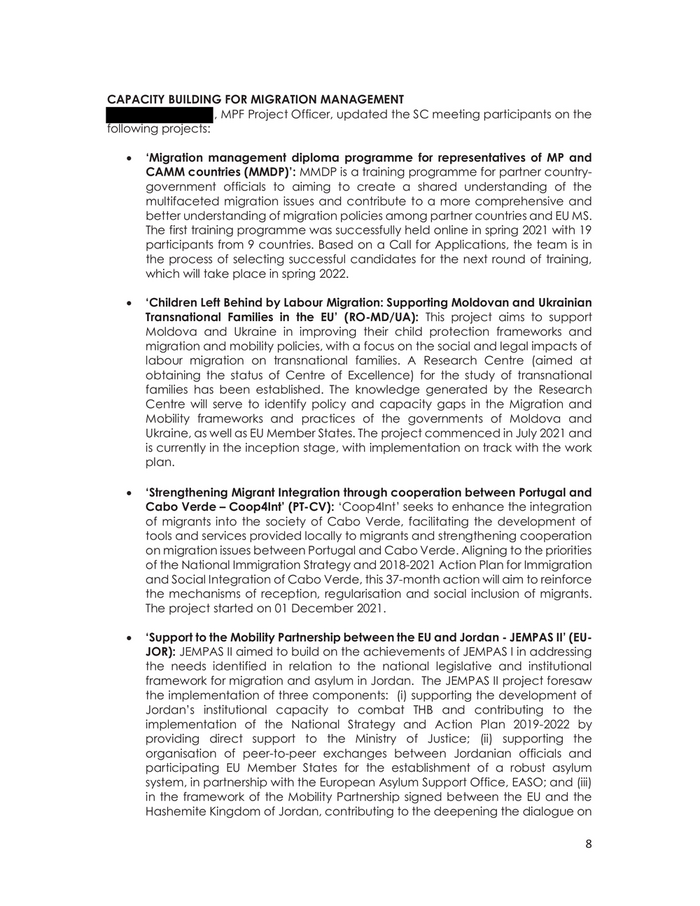
thematic and cross-cutting operational priority areas for cooperation. The project ended on 31.10.2021. Comments/Questions received based on the projects presented: , DG HOME A3, expressed appreciation for the project updates received and requested that the MPF Team boost targeted information about projects to HOME and other EU services on a more regular basis. , DG NEAR, requested that more information at the country level about the MPF projects be channelled to DG NEAR and proposed the possibility to set up kick-off meetings/briefing sessions with relevant EU Delegations for each MPF project. , MPF, confirmed that the MPF shares updated grant information every two months with DG HOME and proposed that this information could be shared with the EU Delegations and DG NEAR if considered suited to their needs. It was agreed that a separate call would be held to discuss the needs in more detail and find an optimal way forward. Update on Knowledge Management: noted that the MPF Team delivered or started the following initiatives during 2021: • Diaspora Study • Labour Mobility Dashboard • Legal Pathways Mapping • Talent Partnerships and Private Sector FDI • Labour Mobility Practitioners Network • Labour Mobility Scheme Guide Moreover, a new MPF website that will be more visually attractive and navigable with real-time data available is under construction. She reported to the participants that, on 22 September 2021, the EU Global Diaspora Facility (EUDiF) and MPF hosted a webinar to present and discuss the newly published research results on the potential role of the diaspora in the implementation of Talent Partnerships (TPs). The webinar recorded a high attendance, with researchers and representatives of each type of actor featured. The Report and the Event Summary are available on the MPF website. The new Labour Mobility Dashboard was developed due to the experience of the first MPF-funded pilot projects of the time-consuming information gaps in partner countries when setting up their mobility schemes. It is intended for use by policy-makers, employers, recruiters and other interested parties looking at employing non-EU nationals either through existing pathways or looking at what country(ies) to target for designing a bespoke labour scheme. The information provided is open source and regularly updated from reliable sources – Eurostat, ILO, Worldbank, OECD. The dashboard includes only Tunisia for now, but it is planned to roll out to four or five more countries in 2022 so that there is searchable comparable data. 9
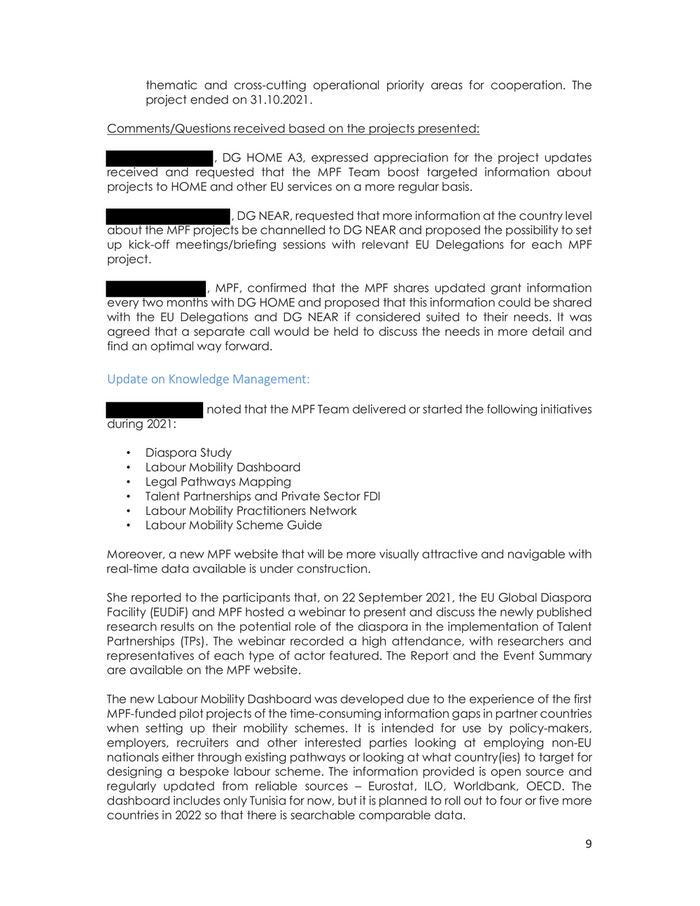
The SC was invited to provide feedback on the data presented to fill in any potential gaps. ICMPD and ECDPM will prepare a study to map out existing legal pathways initially in four EU MS – Estonia, Poland, Portugal and the Netherlands. Belgium has indicated an interest to join in and share information too. The findings should be available at the end of April 2022. Each mapping will include: • Key labour migration statistics (e.g. major countries of origin, flows overtime etc.); • Institutions with competency in legal and labour migration and VET; • Key sectors and regions in demand of labour, key economic partner countries • Pathways overview by categories (covering both EU and national law, low- medium-high skills, seasonal, temporary, permanent, special/bilateral labour agreements, with/without quota systems, to name but a few) and data on usage levels, etc.; and • Analysis and any policy recommendations. On the private sector initiative, explained that it is structured in the following three phases: I. Working Paper on Morocco: third country’s investment environment and opportunities for European SMEs’ skills formation through mobility in the renewable energies, agribusiness, and digital sector. This stage is complete. II. Consultations with Public and Private Sector: to identify and confirm both the public and private sector’s appetite for various models of skills partnerships and facilitate exchanges on avenues for cooperation through targeted outreach and engagement. This stage is complete. III. Webinar to launch the working paper: this event (TBC, January 2022) will bring together policy-makers and business leaders from the EU and partner countries to share views, learn, and jointly reflect on the modalities and challenges on how Talent Partnerships can contribute to unlocking FDI for partner countries, with the example of the EU-Morocco corridor. , MPF Associate Project Officer, updated the participants on the upcoming Labour Mobility Practitioners Network (LMPN): a platform intended to contribute to deeper and more regular engagement with a set group of experts and practitioners. The MPF launched an online survey to 226 labour mobility practitioners in 41 organisations. The survey received 101 responses, with 87% of the respondents willing to join the Network. The respondents' sectoral and thematic interests will be considered in the roll-out of the Network. Based on the responses, the Network will seek to: • exchange, learn and improve the implementation of labour migration initiatives to the EU; • create synergies and capitalise on existing knowledge; and • provide a networking space. The Network will be structured through a private member space online (hosted via the MPF website) and regular meetings (online and offline). 10
